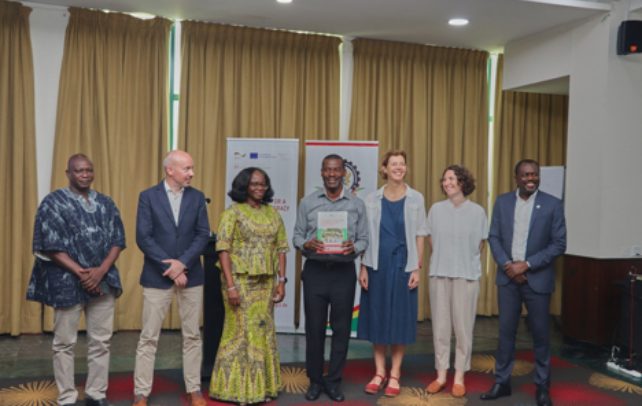Dr. Winfred Nelson (m), and other officials with the guidelines
The National Development Planning Commission (NDPC), in line with its mandate under the National Development Planning Systems Act 1994, Act 480, and the complimentary legislative instrument, L.I, 2232, has developed the guidelines for the preparation of the 2026-2029 Medium-Term Development Plan.
Speaking on behalf of the Greater Accra Regional Minister, Chief Director of the RCC, Lilian Baeka Esq said the guidelines are designed to reflect on national development priorities, fostering coordination and harmonisation of programmes, projects and activities across all levels of development.
The guidelines she said, seek to promote consistency by prescribing the use of defined templates, as well as promoting the use of varied rage of tools and techniques to support the planning of development interventions within defined jurisdictions.
She for the RCC and Metropolitan Municipal and District Chief Executives (MMDCEs) as well as the Coordinating Directors’ commitment to facilitate and provide the needed resources to ensure that the Medium-Term Development Plans are prepared on time and certified on time.
Director, Development Coordination of the NDPC, Dr. Winfred Nelson, said the Medium-Term National Development Plan is scheduled to commence implementation in January 2026, covering the period of 2026-2029.
He highlighted that, all 261 districts will prepare their respective plans, as mandated by law and the 16 regions will also develop their plans, integrating the district plans within their jurisdiction.
He added that, approximately 46 ministries, departments, and agencies will prepare their plans, following an orientation session.
The Project Manager of GIZ, Mathias Berthold, said the Community Action Planning Guidelines, has been developed to close the gap between the communities and the district level for capturing the needs of rural communities and to collect the necessary data and information regarding what is needed in terms of development at the community level.
The Community Action Planning Guidelines he said, consolidates and collects data about the communities and their needs in a standardised manner, that is; the important information for further development planning in the country.
By Janet Odei Amponsah


